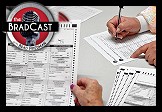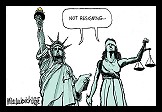READER COMMENTS ON
"'Instant Runoff Voting' (IRV) Election Virus Spreads to Los Angeles County"
(30 Responses so far...)
COMMENT #1 [Permalink]
...
Greg
said on 6/2/2009 @ 6:10 pm PT...
Brad, IRV advanced by "profiteers"? Seriously? It's being advanced in this country solely by good government advocates like Common Cause and FairVote. There's no big money behind IRV whatsoever.
And the conclusion to the story negates your whole claim. Where IRV is advanced, the advocates have made sure that the ballot image files are available for anyone to test for themselves that the count was correct. It's the access to those ballot images that made finding the inaccurate tally. There is not plurality election in this country that makes the ballot images available (to my knowledge). That's why IRV elections in this country are *more* secure, because they are accompanied with strong transparency. The inaccurate tallies produced in plurality elections simply go undetected.
The major backers of IRV in the U.S. are also major backers of the strong election integrity measures that you support. And they do not support Vote-by-mail or Internet voting. Strong election integrity and IRV are very much compatible --- the fact that a very subtle configuration error like the one in Aspen was detected is a testament to that.
COMMENT #2 [Permalink]
...
Chris Telesca
said on 6/2/2009 @ 6:39 pm PT...
Brad wrote:
Along with the emerging nightmares of Internet Voting and Vote-by-Mail, IRV is yet another one of the horrible wack-a-mole schemes being endlessly advanced by advocates and profiteers who put winning elections and making money off them, over the idea of transparent, verifiable, secure democracy and self-governance expressed of the people, by the people and for the people.
He meant that IRV joins these other schemes advanced by people who include advocates and profiteers. FairVote isn't the only group advocating IRV. And FairVote has an interest in a company that sells or could sell RCV software. They have a relationship with The Electoral Reform Society in the UK that has a branch that does make money off elections.
Brad asked Rob Richie if he would advocate banning DRE touchscreen machines. So far - no answer from Rob and FairVote. If you look at a FairVote document from back in the day - they were advocating DRE touchscreen machines in San Francisco.
Access to ballot images do not make elections more secure. Paper ballots that do not need ballot images, strong election integrity laws with mandatory random audits are how you make elections more secure. IRV simply adds un-needed complexity.
Sorry - strong election integrity and IRV have worked out not to be compatible over the years.
Bravo to Brad for not beating around the bush by calling IRV an election virus. It's time to draw a line in the sand on election integrity - and IRV is on the wrong side of the line.
Chris Telesca
Wake County Verified Voting
COMMENT #3 [Permalink]
...
jp2506
said on 6/3/2009 @ 1:49 am PT...
[Ed Note: Commercial spam comment. Deleted. - BF]
COMMENT #4 [Permalink]
...
ArchiCoot
said on 6/3/2009 @ 4:22 am PT...
As someone who has participated in one successful IRV election and witnessed another in Burlington, VT, I can attest to its fairness.
I also chortled and danced a jig with glee when the entrenched corporatist blue dog democratic candidate was defeated both times by a third party candidate.
IRV is a viable method of reclaiming our democracy and I seriously endorse it.
COMMENT #5 [Permalink]
...
Chris Telesca
said on 6/3/2009 @ 8:54 am PT...
How "fair" is IRV when it didn't pick a majority winner in the recent Burlington election: http://noirvnc.blogspot....-burlington-vt-does.html
The third party candidates have been getting elected in Burlington for years without IRV.
Democracy suffers when you can game the election and make it so complicated to count votes that no one is sure if they can trust it. That's the election virus Brad is referring to.
COMMENT #6 [Permalink]
...
Mac_H
said on 6/3/2009 @ 11:21 am PT...
IRV ballots are, by their nature, slightly more complicated to tally than normal ballots, and would generally benefit from computer tallying (if such tallying could EVER by transparent, which I doubt). I "hope" this is what Brad was getting at, as, generally speaking, IRV seems like a good way to go. Personally, I wouldn't object to requiring a waiting period for the release of ANY election results, long enough to allow hand-counting of all ballots, of whatever sort...
COMMENT #7 [Permalink]
...
Brad Friedman
said on 6/3/2009 @ 12:04 pm PT...
Archicoot @ 4 said:
As someone who has participated in one successful IRV election and witnessed another in Burlington, VT, I can attest to its fairness.
The question, as far as I'm concerned, is not of "fairness", but of transparency and oversight.
If you read the article Chris Telesca linked to, you'll see what a hodge-podge of virtually indecipherable math is used in these schemes. All of which makes the currently almost-impossible-to-verify elections we now hold in this country, even more impossible.
A look at the Aspen case that I alluded to in my "Addendum" to the original article above, reveals a similarly impossible scheme to figure out (even for me, who "does" this stuff for a "living", much less folks who don't!)
Now to be fair, Chris argues that IRV may not lead to a "majority" win, but that is also true about plurality voting systems (the system most American elections currently use). He argues instead, in his article that he linked to, for a regular runoff, at a later date, versus an "instant runoff", as with the ranked choice voting of IRV, and that is somehow better.
In reply to Mac_H @ 6, IRV is not "slightly more complicated". It's ALOT more complicated! And virtually requires computer counting, as far as I can tell. It certainly knocks out the idea of full oversight and tabulation at the precinct, by and large (since the second and/or third rounds of math, necessarily, can only happen after all of the totals are centralized).
Mac also suggest "IRV seems like a good way to go". And while I believe the thinking behind IRV by advocates (versus those who are interested in it only as a way to profiteer on elections), is the legitimate belief that it will allow more 3rd party candidates to have an actual shot at winning (an interest that I too share!), I'd far prefer to see Approval Voting over IRV at this time, since AV (in short: where you simply choose YES/NO for any number of candidates you wish), could both be easily and transparently hand-counted and/or counted by existing computer tabulation systems without reprogramming and/or be FAR easier for mere mortals to understand. Whoever gets the most "YES" votes, essentially, is the winner. End of story.
If plurality elections are the problems, I'm not sure IRV is the solution, though AV could potentially be (at least I don't see it presenting the same dangers that IRV currently does).
Finally, also in regard to Mac, I believe it's a fallacy to suggest we have to have a "waiting period for the release of ANY elections results" in order to see them being hand-counted. If they are counted at the precinct, on election night, and precincts are kept small enough to accomplish that quickly, I see no reason why there needs to be any wait for results above and beyond the current wait for computer-tabulated ballots.
And that would be true even if you used AV (which I'm not necessarily advocating for, but simply pointing out as a less-dangerous non-plurality system).
COMMENT #8 [Permalink]
...
Joyce McCloy
said on 6/3/2009 @ 1:58 pm PT...
Fair Vote, the number one advocate for Instant Runoff Voting is partners with "Everyone Counts", the company pushing internet voting.
Brad wrote about Everyone Counts and the internet election in Hawaii here:
5/28/2009 12:20PM
Virtually Voting: Bush's U.S. EAC Chair Cashes In to Head Company Running 'All-Digital' Elections
Paul DeGregorio's 'Everyone Counts' was paid to carry out fully unverifiable, unsecure Internet, phone election in Honolulu
Voter participation plummets 83% to boot...
Here's internet link showing the partnership with FairVote and Everyone Counts:
" FairVote has partnered with E1C to run private sector elections."
http://www.instantrunoff.com/how/counting.php
[E1C is Everyone Counts, which just ran the*Internet election* in Hawaii.]
Blogged by *Brad Friedman * on 6/2/2009 1:38PM 'Instant Runoff Voting' (IRV) Election Virus Spreads to Los Angeles County
Joins 'Internet Voting' and 'Vote-by-Mail' schemes as the latest bad ideas poised to further cripple American democracy
It would be much easier to hold IRV elections over the internet. Fair Vote helped the Arizona Libertarian Party run their primary over the internet in 2008.
Internet voting is a very dangerous way to cast a ballot.
See OP at Huffington Post by Dr. Barbara Simons co-written with Dr. Justin Moore.
Barbara Simons: The Internet and Voting: Worth Doing Right
At the April 24, 2008 meeting of the 2008 Federal Election Assistance Commission Roundtable, Fair Vote Director, Rob advised that: "for instant runoff voting, or preferential voting methods, it often bangs up against the fact that voting equipment isn't flexible enough to handle these voting methods....
IRV has incentivized computerized vote counting where there was none - like in Scotland and encouraged the use of uncertified software in some US jurisdictions.
A nightmare like tabulation system has been proposed for the IRV pilot for Hendersonville NC for the 2008 multi seat contest.
See July 17, 2008
Instant Runoff - If I Were Crazy, I'd Count Votes THIS Way
COMMENT #9 [Permalink]
...
Ska-T
said on 6/3/2009 @ 2:58 pm PT...
I part ways (for the first time) with Brad on this one.
It seems to me that "Approval Voting" would just lead to the election of centrists candidates, election after election after election. Virtually permanent one philosophy rule.
I don't see why we can't have IRV performed on paper ballots and counted manually. Yeah it would take a lot of time and cost more money, but it would be a small fraction of the local, state, or federal budget. And the benefits to democracy are worth it in the present environment of money = free speech, absence of full public funding for elections, and the stranglehold on government by the dysfunctional two party system.
COMMENT #10 [Permalink]
...
Kelly Haughton
said on 6/3/2009 @ 4:26 pm PT...
IRV has had several positive benefits for voters.
One is that most elections systems for IRV publish a ballot image file. This is a listing of each ballot's choices for each IRV race without disclosing whose ballot each one is. This is a database of the ballot information and it is made available on the internet for all to see.
This is a big step forward in openness and transparency in the counting of votes. It allows anyone with internet access to count the votes and tabulate the results. The ballot image file is not available for first-past-the-post elections.
In addition, the existence of the ballot image file makes hand recounts more efficient and more accurate.
COMMENT #11 [Permalink]
...
Brad Friedman
said on 6/3/2009 @ 4:35 pm PT...
Ska-T:
How do you see that AV "would just lead to the election of centrists candidates, election after election after election. Virtually permanent one philosophy rule."?
It seems to me that it'd have the same effect as IRV would. Almost identical, but without the dangers and confusion presented by IRV?
(Mind you, I'm not on an advocacy rampage for AV, I haven't done much advocacy for *any* non-plurality voting system, particularly since realizing the concerns of IRV, which I once softly supported. But *if* one wanted a non-plurality system AV seems far less dangerous, far more transparent, etc. etc.)
COMMENT #12 [Permalink]
...
Brad Friedman
said on 6/3/2009 @ 5:22 pm PT...
Kelly Haughton -
I've heard that mentioned, of late, by a number of IRV advocates.
For a start, while ballot images are a fine second check, where they are available, there is no reason that those ballot images could not similarly be available on "first-past-the-post" elections.
As far as I can tell, and I'm open to be educated here, there's no reason such ballot images couldn't be made available for any election, presuming the op-scanners used are digital image scanners.
That said, please feel free to share why IRV brings scanned ballot images where other elections do not?
COMMENT #13 [Permalink]
...
Bob Richard
said on 6/3/2009 @ 6:30 pm PT...
Brad asks why IRV brings scanned ballot images where other elections do not?
Mainly because IRV activists care about election integrity and help make this happen as part of the IRV implementation process. These data image files could, indeed, be made available for plurality and top-two runoff elections. But they're not.
We're on your side on election integrity, Brad. That doesn't mean we agree with every solution you propose --- in particular, we don't agree that every other reform has to wait until some future Nirvana when fraud and ineptitude are both impossible. It does mean we're aware of the myriad problems with election integrity in the U.S. and serious about addressing them.
On approval voting, if it worked, it would indeed be easier to implement than IRV. Problem is, it doesn't work. Yes, it lets supporters of small party and independent candidates register their support for those candidates. But it also lets candidates win without majority support. Isn't that the problem IRV is meant to solve?
COMMENT #14 [Permalink]
...
Donna Miller
said on 6/3/2009 @ 6:41 pm PT...
"How "fair" is IRV when it didn't pick a majority winner in the recent Burlington election: http://noirvnc.blogspot&...urlington-vt-does.html\"
Certainly fairer than plurality, which would have picked Kurt Wright, the least favored of the three major candidates. Top two runoff would have been a contest between Kiss and Wright, who were the same top two candidates under IRV. It would have been a longer campaign at a higher cost to both the candidates and the taxpayers and probably with a lower turnout, and Wright still might have won.
"Democracy suffers when you can game the election and make it so complicated to count votes that no one is sure if they can trust it. That's the election virus Brad is referring to."
Who is gaming IRV elections? Democracy suffers when voters are afraid to vote for the candidate they really like because they are afraid that the candidate they dislike the most will win. Plurality gives fear-based voting.
I advocate third parties, and I'm tired of being told to wait. First it was "Greens, first wait until we have IRV. Then you can do your third party thing." Making IRV contingent upon something else gives us a much longer wait, more like "Greens, first wait until we have nearly perfect election integrity. Then you can work on IRV, and after that, you can do your third party thing."
As for the "It's Just Too Darn Complicated" excuse, the Aussies and the Irish have been doing IRV for decades. That was long before electronic voting machines were invented! If they can do it, so can we. Burlington counted their ballots in a little over an hour.
COMMENT #15 [Permalink]
...
Steve Chessin
said on 6/3/2009 @ 6:58 pm PT...
Just a few quick comments:
1. Approval voting is still a plurality system, just like first-past-the-post. Whoever gets the most votes wins, even if it is (far less) than a majority.
2. Approval voting requires voters to make a choice between strategic vs sincere voting, as "approving" their second choice can hurt their first choice.
3. One could post scanned ballot images from FPTP elections. In fact, the Humboldt Election Transparency Project (which I heartedly endorse) did just that. It's just that IRV advocates were the first to get the votes on every ballot in a public election posted to the Web. (San Francisco's November 2004 Board of Supervisors election.) (BTW, IRV is compatible with efforts such as the HETP.)
COMMENT #16 [Permalink]
...
Brad Friedman
said on 6/3/2009 @ 7:55 pm PT...
Bob Richard @ 13 said:
Mainly because IRV activists care about election integrity and help make this happen as part of the IRV implementation process.
Then why are IRV proponents so often arguing in favor of working around federal and state voting machine certification processes to change the the way the machines work, so they can run IRV elections? Why shouldn't IRV election systems have to meet the same federal and state standards?
These data image files could, indeed, be made available for plurality and top-two runoff elections. But they're not.
Are you guys, who care about election integrity, fighting to make them so? (I realize that may sound snarky, but I don't actually mean it that way. It's a sincere question.)
We're on your side on election integrity, Brad.
My side of election integrity, such that I have one, is for complete transparency and a process that allows for full citizen oversight. Central counts and computer tabulation do not do that. So far, all of the IRV proponents I've heard from seem to be advocating for exactly that. And, at the same time, seem to have a difficult time calling for the end to all private vendors in the public election process. Are you willing to do that here and now, Bob? Is Rob Richie? Or the others that have been sent this way to comment on this thread? If so, I'd be delighted!
we don't agree that every other reform has to wait until some future Nirvana when fraud and ineptitude are both impossible.
As they will never be impossible (either fraud or ineptitude), that's not what I'm calling for. That would be silly.
It does mean we're aware of the myriad problems with election integrity in the U.S. and serious about addressing them.
Great! I am too, as I'm sure you know. I hope we can work together to that end! Where are you declarations calling for the end of private vendor control and reliance in our elections? Where are your declarations calling for nothing short of complete, 100% transparent elections overseen by the public? I'm ready to sign on to them, whether I agree with you about IRV at this time or not!
COMMENT #17 [Permalink]
...
Joyce McCloy
said on 6/3/2009 @ 8:22 pm PT...
Ballot images were NOT created nor provided in the IRV pilot in Cary NC in Oct 2007.
In fact, officials miscounted just 3,000 ballots. The Director conducted an audit (non public) and the outcome of the election was changed.
IRV is complex to count. Why?
IRV is not additive. There is no such thing as a "subtotal" in IRV. In IRV every single vote may have to be sent individually to the central agency (1,000,000·N numbers, i.e. 1000 times more communication). [Actually there are clever ways to reduce this, but it is still bad.] If the central agency then computes the winner, and then some location sends a correction, that may require redoing almost the whole computation over again. There could easily be 100 such corrections and so you'd have to redo everything 100 times. Combine this scenario with a near-tie and legal and extra-legal battle like in Bush-Gore Florida 2000 over the validity of every vote, and this adds up to a complete nightmare for the election administrators.
IRV often fails to find a majority winner and often the final winner is the same candidate who had most votes in the first round.
See Cary IRV election results for Oct. 2007. After running voters 1, 2n and 3rd choices, Don Frantz obtained 1,401 votes,which is 46.36% of all votes cast in the Cary District B contest. Also see majority failure
IRV in real life does not meet its promise:
The instant runoff election in Burlington,Vermont suffered from nearly every pathology in the book! Non monotonicity - where with instant runoff, a voter can hurt their preferred candidate by ranking them first. A spoiler effect - in this election, Kurt Wright was the spoiler. The "no show" paradox - Wright supporters who also supported Montrol would have helped him if they hadn't shown up to vote at all. Majority failure -the candidate supported by the most voters did not win. Incumbent protection thanks to name recognition. Centrally counted votes - instant runoff opened up the election to fraud because votes were not counted where cast.
COMMENT #18 [Permalink]
...
Donna Miller
said on 6/3/2009 @ 9:20 pm PT...
"IRV is complex to count. Why?"
Again, the Australians and the Irish know how to count IRV. They've done it for decades. It's not rocket science.
"IRV often fails to find a majority winner and often the final winner is the same candidate who had most votes in the first round."
So the final winner is the leader in the first round. That's neither good nor bad.
The "majority failure" canard is constructed by counting exhausted ballots in the final round against the majority. What would happen if we used this standard for top two runoff in last year's Senate election in Georgia?
First round (November 4):
Chambliss (R): 1,867,090 49.8%
Martin (D): 1,757,419 46.8%
Buckley (L): 128,002 3.4%
Turnout: 3,752,577
Second round (December 2):
Chambliss (R): 1,228,033 32.7%
Martin (D): 909,923 24.2%
Abstentions: 1,614,619 43%
COMMENT #19 [Permalink]
...
Donna Miller
said on 6/3/2009 @ 9:46 pm PT...
"The instant runoff election in Burlington,Vermont suffered from nearly every pathology in the book! Non monotonicity - where with instant runoff, a voter can hurt their preferred candidate by ranking them first. A spoiler effect - in this election, Kurt Wright was the spoiler. The "no show" paradox - Wright supporters who also supported Montrol would have helped him if they hadn't shown up to vote at all. Majority failure -the candidate supported by the most voters did not win. Incumbent protection thanks to name recognition. Centrally counted votes - instant runoff opened up the election to fraud because votes were not counted where cast."
1. The election could have been non-monotonic under some special circumstances, but they didn't happen.
2. Under plurality, Montroll would have been a spoiler to Kiss, and Wright would have won. This is a worse outcome than IRV. I wouldn't call Wright a spoiler; he actually had a very good chance of winning until the third round when Kiss overtook him and won by only 3%.
3. The no show paradox didn't show up. If enough Wright voters who preferred Montroll to Kiss didn't show up, Montroll would have been in the final round instead of Wright. However, Kiss still would have won!
4. Again, IRV delivered a better outcome than plurality and at least as good an outcome as top two runoff. The only way to guarantee a Condorcet winner is to adopt Condorcet voting.
5. Incumbent "protection"? No voting system can (or should) guarantee that the incumbent will lose. Sometimes, the voters actually don't want to vote out the incumbent.
6. Show that there is widespread fraud under IRV that is not there under plurality and that it is because of centralized tabulation. Then we can this a problem.
COMMENT #20 [Permalink]
...
Rob Richie
said on 6/4/2009 @ 3:09 am PT...
Healthy debate here. Brad and I obviously don't agree about adopting ranked voting methods, but we do on other like publicly owned, transparent election administration. I can't speak for all IRV advocates, but Steven Hill and I have been calling for that for years. As one example, I'll paste in an excerpt from an oped we co-authored in tompaine.com back in 2004 below.
Before that link, I wanted to emphasize that Australia and Ireland do both hand-counts and ranked voting methods for national elections --- there's no conflict, although in the US people tend not to be too excited about doing hand-counts. Ireland's activist leader in blocking touchscreen voting in her country sees no conflict between ranked voting and election integrity and sees great value in a ranked voting method over plurality. See a statement she wrote for us to post on our site here:
http://www.fairvote.org/?page=2536
Joyce McCloy complains that NC equipment didn't generate local ballot images, but her group was a key reason it didn't happen --- in 2005, the legislature was interested in requiring this capacity, but she assumed (wrong) it would mean touchscreens and fought it.
Note that local election integrity leaders have often volunteered thousands of hours in campaigns for instant runoff voting --- for instance, Rick Lass in Santa Fe (NM) and Anthony Lorenzo in Sarasota (FL), both of which have led their local election integrity efforts and led efforts for big wins for IRV. They think they can go together, and what I hope we can keep doing is moving forward on making it work. As I've told Brad, I think democratic reform most often advances best when reformers work together and see synergy between their efforts. So hope to keep the dialogue going.
Onto that oped link
http://www.fairvote.org/...ific&showarticle=833
Tompaine.com, 11/21/04
Public Interest" voting equipment. Currently voting equipment is suspect, undermining confidence in our elections. The proprietary software and hardware are created by shadowy companies with partisan ties who sell equipment by wining and dining election administrators with little knowledge of voting technology. The government should oversee the development of publicly-owned software and hardware, contracting with the sharpest minds in the private sector. And then that open-source voting equipment should be deployed throughout the nation to ensure that every county --- and every voter --- is using the best equipment.
COMMENT #21 [Permalink]
...
Michaelc
said on 6/4/2009 @ 4:12 am PT...
Conflating IRV with voting count problems is kind of meaningless. Counting problems are a technical problem, and IRV is unrelated to that problem.
IRV is a solution to the undemocratic dominance of the two party system. By ranking candidates according to desirability (something anyone who has ordered at a restaurant should be able to handle) third or forth party candidates actually have a shot at winning because people can register their preferences without worrying about throwing away their vote.
In the last election candidates like Ron Paul and Dennis Kucinich would certainly made more of an impact if showing your support for them did not mean throwing away your vote for the two most likely winners.
At this point the main political parties cover a range from the center to the right wing. Left wing candidates (and pundits) are virtually invisible, not because their views are unpopular (a large majority of the public support single payer healthcare, but neither party does) but because the corporate world has bought ideological discipline in the two parties. Having several viable parties rather than 2 would make the bribers job much more difficult. Bernie Sanders (one of the few independents in congress) is a good illustration of how even a small dissenting element can help broaden the debate.
COMMENT #22 [Permalink]
...
Bob Richard
said on 6/4/2009 @ 8:36 am PT...
Brad @16: I join Rob Richie (@20) and many (if not almost all) IRV advocates in calling for public ownership of all hardware and software specifications and source code. We, the people, need to be telling the vendors what equipment to make and what capabilities it must have. They should not be telling us how to run our elections.
On the issue of public ownership of voting systems, both election integrity and electoral reform lead to the same conclusion. We may have different views on whether machines can ever be secure, but we can agree that they cannot be made secure as long as the designs are in private hands.
COMMENT #23 [Permalink]
...
Phil
said on 6/4/2009 @ 8:42 am PT...
I hear rumors...
California considering 100% vote by mail to save money. I don't know how much money, and frankly I don't care, what I do want to know is a "name" of who is pushing this.
Of course I am not a journalist. So I wouldn't know how to find it out, and I have zero resources so I won't be fighting it.
As usual, It would for obvious reasons be something out of the public's control to protest.
On the other hand, I heard Arnold wants vote by mail completely gone in Kali-fornia.
Enjoy the rumors.
COMMENT #24 [Permalink]
...
Joyce McCloy
said on 6/4/2009 @ 1:26 pm PT...
COMMENT #20 [Permalink]
... Rob Richie said on 6/4/2009 @ 3:09 am PT...
In future, Rob, when you try to tell people what I think, how about quoting me directly and providing links to the readers, instead of misleading people who don't know better.
Rob Richie has a habit of trying to put words in my mouth.
"Trust yet verify" especially when you see someone claim to know what someone else is thinking.
COMMENT #25 [Permalink]
...
Joyce McCloy
said on 6/4/2009 @ 1:40 pm PT...
COMMENT #18 [Permalink]
... Donna Miller said on 6/3/2009 @ 9:20 pm PT...
"IRV is complex to count. Why?"
Again, the Australians and the Irish know how to count IRV. They've done it for decades. It's not rocket science.
IRV is complex to count because it isn't additive, and because the US has far more complex ballots than AU and IE.
Australia and Ireland have entirely different ballots and entirely different political systems. They have a very simple ballot with 1-2 items at most on it. They hand count.
Take a look at just how "simple" Ireland's election results were.
Australians aren't exactly in love with IRV either:
98% of all voters for the Australian senate don't really use STV, they simply mark an "X" in what is called an "above-the-line" vote that accepts the list or "ticket" filed by the voter's preferred party. Why hasn't the Australian lower house adopted STV since Australians are presumably familiar with the system? Australia has 6 states and two territories. Why have 5 of Australia's states refused to adopt STV?
Scotland takes advice of Pro IRV group and ditches hand counted paper ballots
Scotland, adopted STV in 2007, and at the advice of the Pro IRV groups they ditched hand counted paper ballots and purchased the voting machines recommended by the pro STV non profit.
In the US it is common to have from up to 6 ballot pages. We vote for more contests. We directly elect more contests. We have computerized vote counting in most areas of our country.
Using IRV in US elections systems is like trying to put a square tire on a car.
COMMENT #26 [Permalink]
...
Joyce McCloy
said on 6/4/2009 @ 1:45 pm PT...
Just how much do prominent IRV supporters care about election integrity?
Take a look at how Stephen Hill, formerly with Fair Vote attacks California SOS Debra Bowen - in a prominent California newspaper - for implementing security measures, because they would slow down the IRV election in San Francisco:
S.F. supervisors blamed for blocking new voting system
John Wildermuth, Chronicle Staff Writer
Friday, September 21, 2007
If it takes three weeks to count the votes in this November's election, the Board of Supervisors should bear the blame, San Francisco Mayor Gavin Newsom said Thursday...
… The tough restrictions put on the use of the company's voting system in San Francisco are borderline ridiculous given how few people are likely to run into the problems with the ink, said Steven Hill, director of the political reform program of the New America Foundation.
"We're talking about people who drop the pen they're given in the voting booth, don't pick up the pen and then grab another pen without black ink," he said. "That's a pretty small group."
Bowen "is basically throwing the book at ES&S, but it's the city that's bearing the brunt of it," Hill said.
Note this comment to the article in response to Steven Hill's remarks: With the ES&S Optech Eagle system ballots marked with lighter ink can be mis-read by the scanner. Mr. Hill should consider that people who want to cause problems with other voters' ballots can and will switch the pens on purpose, even leaving behind pens that look exactly like the "official" Eagle compatible pens? Should we assume that Mr. Hill is as unaware and foolish as the voters he laughs off, or is he purposely trying to disguise the real and relevant bad marker security threat that comes from cutting corners by using obsolete optical scanner heads? ....
COMMENT #27 [Permalink]
...
Ellen Theisen
said on 6/4/2009 @ 1:57 pm PT...
Brad said:
"In reply to Mac_H @ 6, IRV is not "slightly more complicated". It's ALOT more complicated! And virtually requires computer counting, as far as I can tell."
Ska-T said:
"I don't see why we can't have IRV performed on paper ballots and counted manually."
Rob Richie said:
"Australia and Ireland do both hand-counts and ranked voting methods for national elections --- there's no conflict, although in the US people tend not to be too excited about doing hand-counts."
How many contests are on the ballots in those places, Rob? In the U.S. we have lots of contests, which makes it much more complicated to hand-count IRV.
When Washington State was testing the IRV system used in Pierce County, Patty Murphy, Voting Systems Support, Secretary of State’s Office, said that they tried hand-counting just 14 RCV ballots with seven ranked contests and found that it was “horrendous.” Since the county was expecting about 400,000 ballots in the Nov 2008 election, clearly they could not have even considered hand counting them.
IRV with many contests and many ballots doesn't "virtually require" computer counting. It "requires" computer counting. When any election system is so complicated that regular people can't figure out the winner without applying a complicated computer algorithm, we become dependent on computers for democracy.
With IRV, as Joyce pointed out, you can only determine the winner by evaluating all the ballots. You can't even check the algorithm with just a few ballots to see if it's working. It might work with 100 and not work with 400,000. Or if you only check 100 of 400,000 ballots, the result is meaningless.
IRV is an exercise in trusting computers – computers using an algorithm that is not at all intuitive. While it may be well-intended, the dependence on computers makes is a danger to democracy.
Speaking of non-intuitive, read about the Cambridge method, whereby when a candidate receives enough votes to be considered the winner, remaining votes for that candidate are given to the next ranked candidate on those ballots. This means that some people have their first choice counted, others with that same first choice have their second choice counted.
How is that a "fair" way to count votes?
In fact, that's what mistakenly happened in Aspen.
Plurality voting has its problems, but it's understandable to the common person. That's essential in a democracy.
COMMENT #28 [Permalink]
...
Rob Richie
said on 6/4/2009 @ 3:24 pm PT...
Hi, Ellen
I'd welcome your comments and those of others on our discussion of ranked ballots and election integrity.
http://fairvote.org/?page=2470
As to the Cambridge system, it has a long history of use, consideration and support. As referenced in my posting earlier, one of the leading election integrity activists in Ireland gave us a strong statement in support of that system to use --- it's been used to elect its parliamentary since the 1920s. See her statement:
http://www.fairvote.org/?page=2536
COMMENT #29 [Permalink]
...
Eleanor
said on 6/5/2009 @ 7:07 pm PT...
As a teacher (retired) of computer science at a major university, I have thought about how to program IRV. First, there is no general agreement on exactly what IRV means. Do you retain all candidates until a winner is selected or only the top 3 or 4? Second, once a procedure is selected, there are a lot of programming decisions to be made. Having taught coding, and having read about the quality of code written for voting machines, I would say DON'T PUT IRV ON ELECTRONIC VOTING MACHINES!
COMMENT #30 [Permalink]
...
Joyce McCloy
said on 6/9/2009 @ 4:33 pm PT...
Chris Telesca of Wake Verified Voting (Wake is home county of Cary NC) observed the IRV counting in Wake County, NC.
The first round of votes were counted by machine, then the ballots were taken to a central location to tally the 2nd and 3rd choice votes.
Officials only had to hand count a little over 3000 paper ballots (after the first choice votes were counted on the op-scan machines.
There were only 3 candidates plus a few write-ins for the Cary district B, single member town council seat.
The counting went only two rounds yet it took 6 sorting stacks for each of 12 ballot groupings or precincts (8 precincts plus absentee by mail in Cary, board of elections one-stop site, the Cary one-stop site, provisional ballots- Cary, and possibly some transfer votes from another county which were eligible to vote in the Cary IRV contest) or 12 times 6 stacks = 72 stacks.
Wake County officials decided to put each stack in a separate plastic bag to keep track. This would not be possible if there were more than one IRV contest because each contest requires independent sorting and stacking to count
The procedure was very complicated, but
it was there in print. Even so, the Wake Board of Elections (BOE) didn’t follow it.
There was no overhead projector so that
observers could follow the process. Non Board members were sorting the ballots into stacks which was hard to follow.
Nonetheless, observers and the Board came up with different totals at the end of the day. The next day, the different totals were determined to be caused by a calculator error that was discovered in an “audit” – that also discovered a few missing
votes. The “audit” – which had to have included going back into the previously sorted/stacked and counted ballots – was not done in public.
It took 3.5 hours minimum to do the first expedited processing of the 3000 ballots, not including the non-public “audit”.


 Sunday 'Happyish Holidays' Toons
Sunday 'Happyish Holidays' Toons Trump Gets Trumped in Our Musky Year-End Roundtable: 'BradCast' 12/19/24
Trump Gets Trumped in Our Musky Year-End Roundtable: 'BradCast' 12/19/24 'Green News Report' 12/17/24
'Green News Report' 12/17/24
 About Some of Trump's 'Day One' Threats: 'BradCast' 12/18/24
About Some of Trump's 'Day One' Threats: 'BradCast' 12/18/24 Trump Family Corruption Cometh...So Does Our Opposition: 'BradCast' 12/17/24
Trump Family Corruption Cometh...So Does Our Opposition: 'BradCast' 12/17/24 'Green News Report' 12/17/24
'Green News Report' 12/17/24 Mistallied Contests Found in OH County, as Oligarchy Rises in D.C.: 'BradCast' 12/16
Mistallied Contests Found in OH County, as Oligarchy Rises in D.C.: 'BradCast' 12/16 Sunday 'Barrel Bottom' Toons
Sunday 'Barrel Bottom' Toons Trump Admits He Can't Lower Grocery Prices (Biden Just Did): 'BradCast' 12/12/24
Trump Admits He Can't Lower Grocery Prices (Biden Just Did): 'BradCast' 12/12/24 'Green News Report' 12/12/24
'Green News Report' 12/12/24 What 'Unprecedented and Powerful Mandate'?: 'BradCast' 12/11/24
What 'Unprecedented and Powerful Mandate'?: 'BradCast' 12/11/24 Trump Barely Won Natl'y, But Won 'News Deserts' By Landslide: 'BradCast' 12/10/24
Trump Barely Won Natl'y, But Won 'News Deserts' By Landslide: 'BradCast' 12/10/24 Bad Weekend for Authoritarians; Also: Pardon or Not?: 'BradCast' 12/9/24
Bad Weekend for Authoritarians; Also: Pardon or Not?: 'BradCast' 12/9/24 Fox 'News' and GOP Get Their Hateful War on Trans Kids at SCOTUS: 'BradCast' 12/5/24
Fox 'News' and GOP Get Their Hateful War on Trans Kids at SCOTUS: 'BradCast' 12/5/24 'Mind Boggles at Potential Corruption' in Trump Scheme: 'BradCast' 12/4/24
'Mind Boggles at Potential Corruption' in Trump Scheme: 'BradCast' 12/4/24 In Defense of Democracy from S. Korea to N. Carolina: 'BradCast' 12/3/24
In Defense of Democracy from S. Korea to N. Carolina: 'BradCast' 12/3/24 Hunter's Pardon: 'BradCast' 12/2/24
Hunter's Pardon: 'BradCast' 12/2/24 How (and Why!) to 'Extend Olive Branch' to MAGA Members: 'BradCast' 11/21/24
How (and Why!) to 'Extend Olive Branch' to MAGA Members: 'BradCast' 11/21/24
 VA GOP VOTER REG FRAUDSTER OFF HOOK
VA GOP VOTER REG FRAUDSTER OFF HOOK Criminal GOP Voter Registration Fraud Probe Expanding in VA
Criminal GOP Voter Registration Fraud Probe Expanding in VA DOJ PROBE SOUGHT AFTER VA ARREST
DOJ PROBE SOUGHT AFTER VA ARREST Arrest in VA: GOP Voter Reg Scandal Widens
Arrest in VA: GOP Voter Reg Scandal Widens ALL TOGETHER: ROVE, SPROUL, KOCHS, RNC
ALL TOGETHER: ROVE, SPROUL, KOCHS, RNC LATimes: RNC's 'Fired' Sproul Working for Repubs in 'as Many as 30 States'
LATimes: RNC's 'Fired' Sproul Working for Repubs in 'as Many as 30 States' 'Fired' Sproul Group 'Cloned', Still Working for Republicans in At Least 10 States
'Fired' Sproul Group 'Cloned', Still Working for Republicans in At Least 10 States FINALLY: FOX ON GOP REG FRAUD SCANDAL
FINALLY: FOX ON GOP REG FRAUD SCANDAL COLORADO FOLLOWS FLORIDA WITH GOP CRIMINAL INVESTIGATION
COLORADO FOLLOWS FLORIDA WITH GOP CRIMINAL INVESTIGATION CRIMINAL PROBE LAUNCHED INTO GOP VOTER REGISTRATION FRAUD SCANDAL IN FL
CRIMINAL PROBE LAUNCHED INTO GOP VOTER REGISTRATION FRAUD SCANDAL IN FL Brad Breaks PA Photo ID & GOP Registration Fraud Scandal News on Hartmann TV
Brad Breaks PA Photo ID & GOP Registration Fraud Scandal News on Hartmann TV  CAUGHT ON TAPE: COORDINATED NATIONWIDE GOP VOTER REG SCAM
CAUGHT ON TAPE: COORDINATED NATIONWIDE GOP VOTER REG SCAM CRIMINAL ELECTION FRAUD COMPLAINT FILED AGAINST GOP 'FRAUD' FIRM
CRIMINAL ELECTION FRAUD COMPLAINT FILED AGAINST GOP 'FRAUD' FIRM RICK SCOTT GETS ROLLED IN GOP REGISTRATION FRAUD SCANDAL
RICK SCOTT GETS ROLLED IN GOP REGISTRATION FRAUD SCANDAL VIDEO: Brad Breaks GOP Reg Fraud Scandal on Hartmann TV
VIDEO: Brad Breaks GOP Reg Fraud Scandal on Hartmann TV RNC FIRES NATIONAL VOTER REGISTRATION FIRM FOR FRAUD
RNC FIRES NATIONAL VOTER REGISTRATION FIRM FOR FRAUD EXCLUSIVE: Intvw w/ FL Official Who First Discovered GOP Reg Fraud
EXCLUSIVE: Intvw w/ FL Official Who First Discovered GOP Reg Fraud GOP REGISTRATION FRAUD FOUND IN FL
GOP REGISTRATION FRAUD FOUND IN FL


































